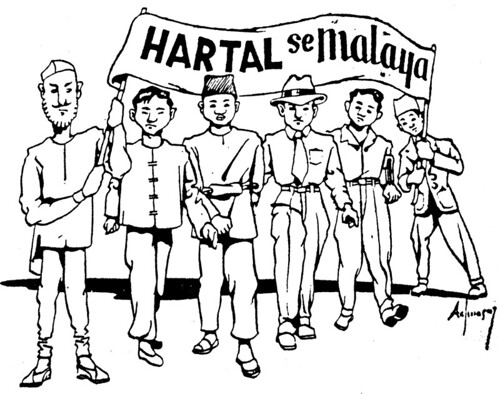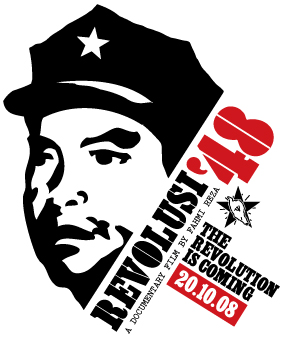THE PAN-MALAYAN COUNCIL OF JOINT ACTION
by John Eber
The PMCJA is the expression of a movement which has been developing for the last 20 years and of which Mr. Tan Cheng Lock has been the pioneer.
Colonial imperialist policy has ever relied on the truth of the slogan “Divide and Rule.” The recent history of India shows that this method of ruling though effective from the point of view of the rulers has the result of stirring up among the ruled such animosities and jealousies that they are prevented from effective self-government. This only serves, of course, to emphasise the value of the “Divide and Rule” policy, as far as the ruling power is concerned; it facilitates control over colonies or “protected territories,” and renders them impotent when the movement for self-government is on the brink of success.
However, it is possible for the ruled, as well as rulers, to learn by their mistakes. The history of Malaya shows surprising similarity in certain respects; even today, the “Constitutional Proposals” drafted by the Working Committee have a strong family resemblance to the constitution of some Indian States.
During the war, the people of Malaya have awakened with a start to the realisation that they are one of the few groups of people left in the world who have not achieved even a semblance of representative self-government. A war on the scale of this last war cannot but force even the least politically advanced people to question themselves as to the relevant issues. Allied propaganda was to the effect that the war was a fight for freedom and democracy and the Atlantic Charter put such sentiments down on paper. Malaya suffered in that struggle for democracy and, by direct contact with the Fascist enemy, came to realise by personal experience, the relevant issues. This fact hastened immeasurably the progress of the realization of the necessity for the creation of a nation in Malaya, in which the deliberate encouragement of division and separation between the racial groups in Malaya had no part, and in which, on the contrary, those racial groups could co-operate in the peace, security and prosperity of Malaya. This necessity was realised outside Malaya, and Mr. Tan Cheng Lock’s work in India contributed to this realisation. A result of this realisation was the Union scheme, which, however, failed adequately to consider the special position of the Malays. In spite of a long period of the so-called “pro-Malay policy” of Malayan Governments, the Malay people as a whole have reaped little benefit from such a policy, which has relied to a greater extent on words than on deeds. The Malay people are now coming to an understanding of the lack of value of such a policy on the part of a non-democratic government, and of the greater value of such a policy on the part of a democratic movement, in which all racial groups joined hands in tackling the primary task of democracy in Malaya – the betterment and stabilisation of the economic and educational position of the Malays. A programme of equality “for all who make Malaya the object of their undivided loyalty” must be based on this fundamental consideration – that political equality is unreal unless there is economic and educational equality. This is only common-sense: a programme of equality does not presuppose equality, it aims at equality; it aims at special effort to push forward those whose educational and economic position is weak, in order to make the political equality a reality.
This consideration is, however, taken as an excuse by those who seek to delay the setting-up of democratic institutions, who claim that the political equality must await the economic and educational equality. That this claim is made by those who possess vested interests in Malaya, can only arouse the suspicion on the part of the people that the claim is based on self-interest rather than on an objective view of the best interests of the people. Here again the recent history of India has shown that a controlling-power has at its finger-tips a variety of reasons why that control should not be relinquished, and that those reasons are revealed in practice to be no more than excuses.
The educational and economic equality of the people as a whole can, in fact, only be undertaken by the people as a whole themselves since it is to the definite disadvantage of the people as a whole to retard the progress of their less fortunate elements. The economic and educational advancement of the Malay population can best be achieved by the co-operation of all races in Malaya, working together for the mutual benefit through democratic institutions. It is not a question of running before learning to walk; democracy is not a privilege, exclusively reserved for ‘advanced” races with white skins; it is a right. To say that a group of people are “not yet ready for self-government” is to say that there are other groups of people who are not only ready for self-government but are ready for the government of other groups.
This arrogant claim would not be open to the accusation of self-interest if colonies were not a profitable concern; the fact that they are a profitable concern renders this claim very open to the challenge of self-interest.
In the months after the occupation of Malaya, this movement of the people of Malaya towards unity grows in intensity, and led ultimately, in December 1946, to the formation of the PMCJA, composed of Associations, of all races, pledged themselves to work for a constitution for Malaya based on the following 3 principles:-
(a) A United Malaya inclusive of Singapore:
(b) Responsible self-government through a fully elected central legislature for the whole of Malaya and
(c) Equal citizenship rights for all who make Malaya their home and the object of their undivided loyalty.
The first act of the PMCJA was to oppose the undemocratic and secret methods by which the new proposals were drawn up.
After the publication of the proposals, it was realised, with the best will in the world, they could not be accepted, since they were based on principles which were fundamentally unsound. All elections were refused, an artificial and valueless citizenship created, and the official majority continued to exist (although some of the officials were to assume disguise); the Malay Rulers were again required “to undertake to accept the advice of the High Commissioner,” a requirement which rendered hollow the British claim that the Malay Rulers were to be sovereign (though constitutional) monarchs.
The PMCJA therefore had no alternative but to reject the proposals, and special emphasis was laid on the unreality of the claim that the interests of the Malays had been protected. It was pointed out that the interests of the masses of the Malays had been over-looked. With the setting-up of the Consultative Committee, it began to be very clear that the proposals, as they stood, were to be protected from any organized and powerful criticism, by the use of divisionist and separatist machinery. Such machinery has been tried in India and has been found to be successful in this function. The PMCJA was therefore resolved to boycott the Consultative Committee, as being composed of nominated individuals with no right or claim to act as the mouthpiece of the people, and as being designed to render impotent the criticism offered, by by-passing the opposition of the PMCJA, the unified expression of the opinions of the people.
The PMCJA will continue its opposition to attempts to split the unity of the people, to deny to them their right to co-operate in the building of the future constitution of Malaya. The PMCJA stands for the unity of all races in Malaya, a unity based on the real equality of opportunity which requires a special consideration for the position of the Malays.
Source: Appendix buku Tan Cheng Lock ‘Malayan Problems’, published by TANNSCO, 1947
Rabu, September 05, 2007
Artikel tentang PMCJA, Jan 1947
Dicatat oleh
Fahmi Reza
di
3:06 PTG
![]()
Kategori: Artikel, Badan Politik, PUTERA-AMCJA
Langgan:
Catat Ulasan (Atom)








3 ulasan:
Tahniah kerana mengembalikan perbincangan tentang sejarah negara. Yang ditutup harus dibuka.
Yang lebih membanggakan lagi apabila anak-anak muda yang kembali membongkar sejarah. Penipuan, manipulasi harus didedahkan.
Tahniah sekali lagi.
masa sekolah rendah atau menengah dulu ada terbaca dalam buku teks pasal 'Hartal', tapi penerangan tentangnya hanya sipi-sipi dan berbentuk negatif.
akibatnya, selama ini ingatan tentang perkataan 'hartal' ini boleh dikata hampir terhapus dari memoriku sehinggalah menonton tayangan 'Sepuluh Tahun Sebelum Merdeka' ini.
selepas menonton filem ini, aku telah sedaya-upaya menggali semula ingatanku terhadap 'hartal' yang terdapat dalam buku teks sejarah di sekolah dahulu itu.
aku kesian terhadap nasib diriku sendiri atas nasib malang akibat penipuan dan penyerongan sejarah ini.
aku sepakat dengan black dan berharap agar inisiatif fahmi ini akan dapat dikembangkan, dipelbagaikan dan diperhebatkan, mungkin saja sebagai pemangkin kepada cita-cita gerakan anak muda Malaysia yang dinamis!
~aku mau ikut~
Bila aku buka balik Buku Teks KBSM Sejarah Tingkatan 3 (DBP 1998), memang ada sebut pasal hartal. Dalam Bab 2 yg bertajuk 'DARI MALAYAN UNION KE PERSEKUTUAN TANAH MELAYU' ada tertulis:
Pada bulan April 1947, AMCJA-PUTERA telah mengemukakan 'perlembagaan rakyat'. British telah menolak perlembagaan itu kerana British tidak mahu bekerjasama dengan golongan kiri yang diperalat oleh komunis. Oleh itu AMCJA-PUTERA melancarkan hartal di seluruh tanah air kerana membantah tindakan British itu. Dewan perniagaan Cina turut menyertainya dengan menutup kedai pada hari pelancarannya itu. Sebenarnya hartal ini tidak banyak meninggalkan kesan. Hartal gagal dilancarkan di Perlis, Johor, Kelantan dan Terengganu.
Tapi kalau kau buka Buku Teks Tingkatan 3 yang terbaru (DBP 2006), langsung takde sebut pasal hartal. Tapi satu yang menarik dalam Buku Teks baru ni ialah apa yang dia tulis pasal PKMM.
Parti Kebangsaan Melayu Malaya (PKMM) ditubuhkan pada bulan Oktober 1945 oleh Parti Komunis Malaya di Ipoh, Perak. Presiden pertama ialah Mokhtaruddin Lasso, Ketua Rejimen 10 Melayu, Parti Komunis Malaya.
Hampir semua Buku Teks Sejarah suka kaitkan atau besar-besarkan pengaruh Parti Komunis Malaya terhadap golongan kiri dalam PUTERA-AMCJA.
Catat Ulasan